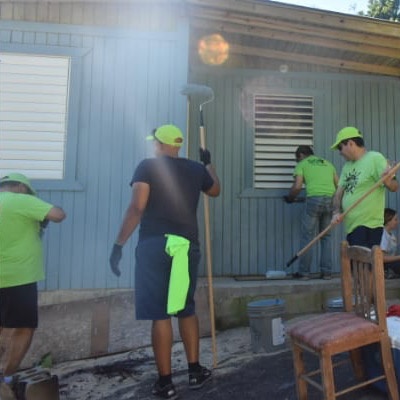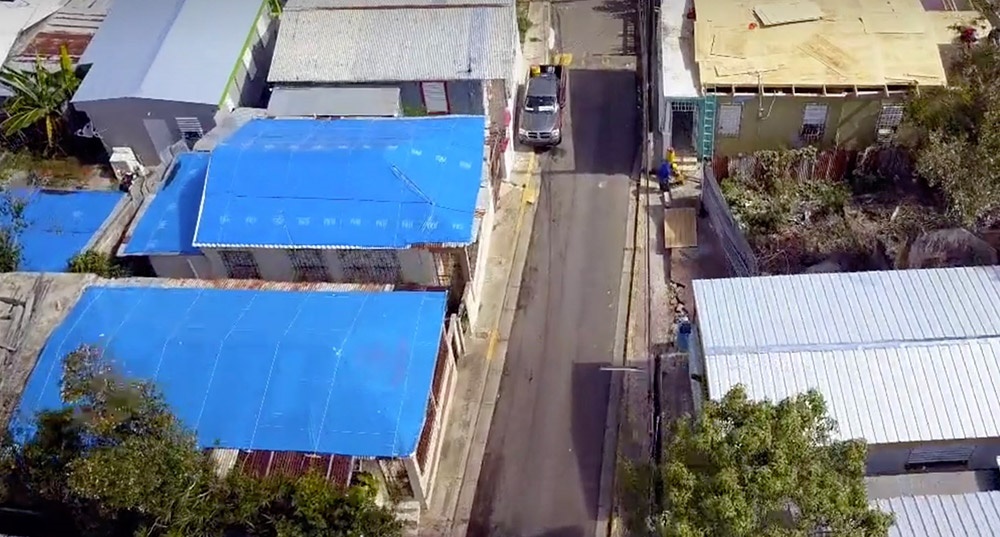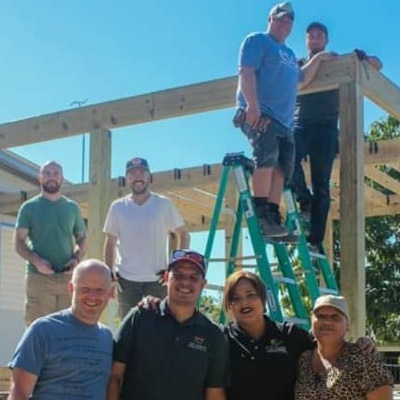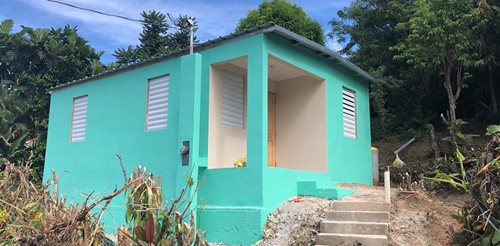The letter X, marked in red paint on houses in Puerto Rico, is easy to spot. It means a home is uninhabitable, explains Elizabeth Colon Rivera, executive director of Ponce Neighborhood Housing Services, a NeighborWorks organization in Ponce, Puerto Rico. The letters were painted after earthquakes hit southern Puerto Rico beginning in December, part of what is being called a "swarm."
"Some of the homes were already debilitated when the earthquakes came, and they were hit hard," Colon Rivera says.
"Some of the homes were already debilitated when the earthquakes came, and they were hit hard," Colon Rivera says.
That's because of what happened before the earthquakes, when Hurricanes Irma and Maria – within just a few weeks of each other in September 2017 – caused billions of dollars in damage, destroying infrastructure and leaving the island in darkness. Another hit came after the earthquakes with the spread of COVID-19. In Puerto Rico, as in other parts of the United States, it halted jobs. It halted the tourism that had started to return. It slowed construction and rebuilding on an island that continues to try to right itself.
 "Nonprofits have been the first responders in this process," says Colon Rivera. Hundreds of homes have been rehabilitated and reconstructed. But there are many, many more to go. "We still have families with blue tarps [covering parts of their homes] and the pandemic emergency has slowed down all the reconstruction process."
"Nonprofits have been the first responders in this process," says Colon Rivera. Hundreds of homes have been rehabilitated and reconstructed. But there are many, many more to go. "We still have families with blue tarps [covering parts of their homes] and the pandemic emergency has slowed down all the reconstruction process." Nonprofit leaders say that while the public believes Puerto Rico received billions in funding over the past three years, only a small part of that funding has reached the commonwealth. Federal authorities cited corruption and mismanagement concerns in delaying the tranche of money, allocated through the U.S. Department of Housing and Urban Development (HUD). Following an uprising last summer, Puerto Rico saw a change in governors.
"We're receiving small amounts of money, but with small amounts of money, we're doing great things," Colon Rivera says.
"There are a lot of challenges," agrees Maria Rodriguez-Collazo, director of housing programs at PathStone Corp., another NeighborWorks organization in Puerto Rico. Like Colon Rivera, her goal is to meet those challenges. "One of the biggest lessons we've learned: Everything is easier and families can recover better when we're organized, when leadership is in place, when people know who to contact when they have an emergency and how to react." But the emergencies, she says, keep coming. "We haven't stopped having disasters."
August marks three years since Maria. But the month brought with it Isaias, which knocked out power and caused more flooding, and Tropical Storm Laura, which did the same. At the end of August, the president approved another emergency disaster declaration.

"Our natural disasters are overlapping each other," says Colon Rivera. Just when they emerge from one, thinking they're managing, another one follows.
August marks three years since Maria. But the month brought with it Isaias, which knocked out power and caused more flooding, and Tropical Storm Laura, which did the same. At the end of August, the president approved another emergency disaster declaration.

"Our natural disasters are overlapping each other," says Colon Rivera. Just when they emerge from one, thinking they're managing, another one follows.
In fact, disaster preparedness became a course that Puerto Rico Neighborhood Housing Services Corp. began offering for residents, along with its homeownership courses. The nonprofit started an emergency-ready backpack program, offering residents first-aid kits, food and hygiene products for emergencies. The newest item in the backpack is a facemask.
Rehabilitation is taking too long, says Blanca Velez Beauchamp, executive director of Puerto Rico Neighborhood Housing Services Corp. (PRNHS), also a NeighborWorks organization. Cristian Miranda, who helps Velez Beauchamp lead the recovery effort and housing counseling, says the organization had to become creative. They've put together funds, including funds from NeighborWorks, to help them deliver what they've promised to the communities that surround them.
"After the hurricane, we started educating people on disaster preparedness," says Velez Beauchamp. "Things that never touched us ― now they are happening."
The organization has repaired rooftops. They delivered first-aid packs to more than 500 families. They are currently rehabbing apartments for teens who become adults while in the foster care system, part of a partnership with the program "Vida Independiente," or Independent Life. Under the program, PRNHS covers utility bills and provides bedding and furniture for the teens, some of whom volunteer with the organization. The Department of Family of Puerto Rico covers rent until the teens wait to qualify for Section 8 housing or find jobs.

Meanwhile, they are fielding calls on foreclosure prevention while staff members work to become HUD-approved housing counselors. They continue to conduct online classes for first-time homeowners (with the interest rates down, people are still interested in buying, Miranda says). And they continue to adjust to remaining socially distant as they effectively carry out their jobs.
Puerto Ricans like to see each other in person when they do business, Velez Beauchamp says. "They like to come; they like that touch. We cannot have that touch anymore" because of COVID.
Walk through San Juan today, Miranda says, and you'll see half the city that is half developed, half abandoned. "We have what is happening in the states," he says. "We have gentrification. It is at a slower pace than Brooklyn and other cities, but you can see where it's going. We have development and we have underdevelopment."
Velez Beauchamp says that a lot of the problems in the states stemming from the pandemic mirror those in the commonwealth. "The only difference is there, there is movement."
One plus? Nonprofits have been working together and forming partnerships, Miranda and Velez Beauchamp say. As first responders, they have bonded together and grown stronger.
That is the goal for homes, too, says Rodriguez-Collazo: "to make them stronger than they were." In the past, she says, a number of buildings in Puerto Rico did not follow building code. "The thing our program is very proud of – every home we touch is brought to code," Rodriguez-Collazo says. "We get permits. We make the families understand how important it is to follow the building code. It's a matter of life. We want them to have a home where they can feel safe inside." Where they can be safe inside.
Some homes are not worth saving, she says. In those situations, they talk to families about relocating. "All our programs are very tied with education," Rodriguez-Collazo says. "We believe the most important part of recovery for families is through education: what to do before an emergency, how to respond. They know what to look for in a house, how important it is to be safe."
She says they talk to families about insurance, too: How to submit claims. How to file appeals if those claims aren't met.
In Ponce, too, the focus is on education, everything from housing to disaster preparedness. "Time hasn't stopped because of this situation," Colon Rivera says. "Families still have a lot of needs. They're still struggling. They're still struggling a lot."
Rodriguez-Collazo says the island is still in the initial steps of recovering and rebuilding. "We haven't been able to move forward in the manner we deserve."
Colon Rivera says she has been grateful for help from NeighborWorks as her organization has moved forward. "It's not just the money," she says. "It's the helping hands; a shoulder to cry on and ears that can listen to us."
She says that the people of Puerto Rico – hundreds of them still living with friends or relative or camped outside of homes – are resilient. "We are just asking for an opportunity to stand up again and reinvent ourselves and make things happen. We have families and municipalities trying to get back on their feet. They just need the right resources."
 NeighborWorks America is trying to provide some of those resources through both funding and a nonprofit capacity building program known as the Puerto Rico Nonprofit Leadership Development Initiative. The program, funded primarily by NeighborWorks and coordinated by Enterprise Community Partners, also found partners in the Community Foundation of Puerto Rico and the Federal Reserve Bank of New York. Both Ponce NHS and PathStone will participate in the program, part of a cohort of organizations that will receive one-on-one mentoring and technical assistance. There will also be peer learning along with grant awards of up to $35,000 per organization that will be used for staffing and training expenses, says Joanie Straussman Brandon, NeighborWorks America's regional vice president for the Northeast Region.
NeighborWorks America is trying to provide some of those resources through both funding and a nonprofit capacity building program known as the Puerto Rico Nonprofit Leadership Development Initiative. The program, funded primarily by NeighborWorks and coordinated by Enterprise Community Partners, also found partners in the Community Foundation of Puerto Rico and the Federal Reserve Bank of New York. Both Ponce NHS and PathStone will participate in the program, part of a cohort of organizations that will receive one-on-one mentoring and technical assistance. There will also be peer learning along with grant awards of up to $35,000 per organization that will be used for staffing and training expenses, says Joanie Straussman Brandon, NeighborWorks America's regional vice president for the Northeast Region.The kickoff meeting for the initiative was held at the beginning of June. Straussman Brandon says organizations will work on areas like fundraising, organizational efficiencies and property management. "The idea is that by the end of it, the participants will be stronger leaders, and their organizations will have gained additional capacity in areas that they have self-selected."
They'll need to be as they continue to move forward, as they have each time there's been devastation, Straussman Brandon says. "Fortunately, there are still funders, some external, some on the island. They realize there's a need there. Nonetheless, so much more is still needed."
"The word and message I want to send to everyone in the [United] States and to other Puerto Ricans in the diaspora: We're not asking for charity," says Colon Rivera. "We're asking for opportunities and resources to stand on our feet again."
It's a lot of work, says Velez Beauchamp. But construction permits are coming through and leaders from all of the NeighborWorks nonprofits say they have hopes for what will follow.
At the same time, "it's hurricane season," Miranda says.
"What's next?" asks Velez Beauchamp. "We don't know."
Some lessons community leaders have learned from working through recent disasters:
- "Collaboration and coordination with other service providers and nonprofits are so important to really have impact by leveraging resources," Straussman Brandon says. The Puerto Rico Nonprofit Leadership Development Initiative is hoping that further collaboration will be encouraged among the organizations taking part.
- "When a disaster happens, nonprofits are the first responders to give a helping hand and a sense of hope that the communities will recover and be strong again," says Colon Rivera.
- "It is imperative to take into consideration the real necessities that the communities are facing to be effective in a rebuilding process," Colon Rivera says. "Sometimes we are so desperate to assist and support them, that we missed their real needs and have not listened to their voices. Community voices are the key to achieve a successful rebuilding and recovery process; never forget that."

